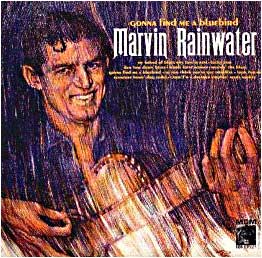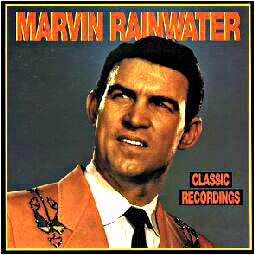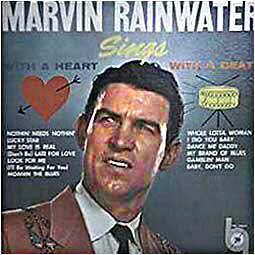


MARVIN RAINWATER
He was born Marvin
Percy Rainwater in 1925. After a stint in the Navy during World War II serving
as a pharmacist's mate, he turned to music full-time. He had originally been a
classically trained pianist, but after an accident had removed part of his right
thumb, he turned to country music and soon learned to strum a guitar
proficiently enough to accompany his singing and compose songs on it. After
putting down roots in nearby Virginia, Rainwater quickly became a fixture on the
Washington, D.C., area honky tonk circuit, putting together his first band
featuring a young Roy Clark on lead guitar and himself decked out in buckskin
jacket and Indian headband. His first recordings came through the auspices of
Bill McCall at 4-Star Records.
McCall also took three completed masters from other sessions ("I Gotta Go Get My
Baby," "Hearts' Hall of Fame," and "Albino Stallion") and had them pressed on a
custom promotional 45, then promptly sold the masters to Coral Records.
Rainwater's recording of "I Gotta Go Get My Baby" was promptly handed over to
Teresa Brewer, who covered and had a hit with it in the pop market. But what
propelled Rainwater up the show business ladder was a successful television
performance on Arthur Godfrey's Talent Scouts, the early-'50s equivalent of Star
Search.
Rainwater then
started recording for M-G-M Records, his longest lasting label affiliation. The
recordings are as scatter-gunned of an approach to commercial recording as you
can possibly imagine. Solemn Americana recitations ("Pink Eyed Stallion") sat
alongside novelty fluff like "Tennessee Hound Dog Yodel," which were B-sided by
straight-ahead country weepers rife with down-home sentiments. Suddenly at his
next recording session in March 1956, Rainwater shifted gears again, deciding to
cast his lot with the emerging rockabilly sound. The result was a two-sided
blast of tonal mayhem, coupling the out-of-control "Hot and Cold" with the
slightly less frenetic "Mr. Blues."
But rockabilly was a way for country artists to achieve pop stardom and, with
the first successful attempts at crossover appeal already in place, Rainwater
didn't have to wait long to find his song. That tune was "Gonna Find Me a
Bluebird," a tune that went to number three on the country charts while
simultaneously climbing to number 18 on the pop charts. Suddenly flush with
success, Rainwater quit the Ozark Jubilee and moved his base of operations to
New York City, ready to take on the world. But the follow-ups to "Gonna Find Me
a Bluebird" were as diverse and quirky as his pre-hit output.
After a nine-month layoff, he signed with Warwick Records and with Link Wray and
the Raymen backing him, put out a pair of singles that were as fine as anything
he had recorded in his heyday. But the marketplace in both pop and country had
changed a lot since 1957, and the sides fell stillborn at the presses. Going for
it one more time, Rainwater and new partner Bill Guess built a studio in Chicago
and started up Brave Records, solely devoting its catalog to new songs from the
singer. Aside from a brief stay with United Artists in 1964 and a one-off
session for Warner Brothers in 1969, the Brave singles document Rainwater's last
commercial sides.


